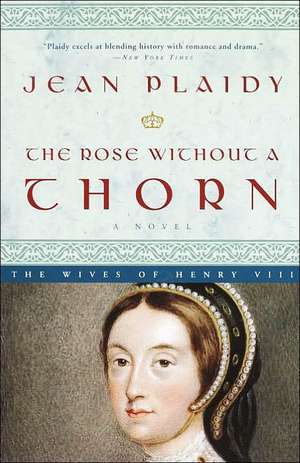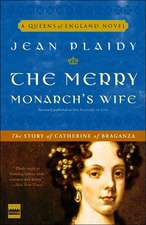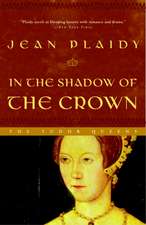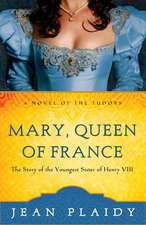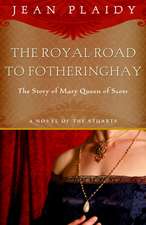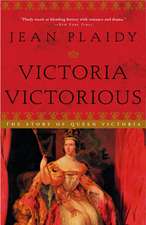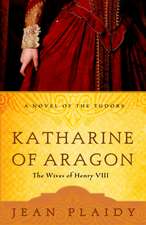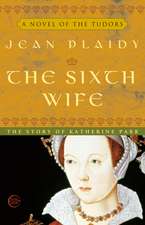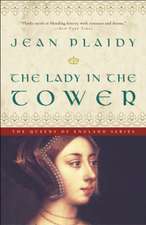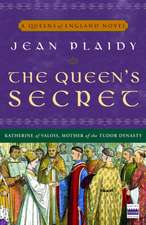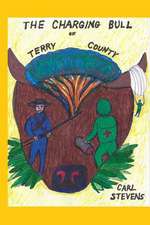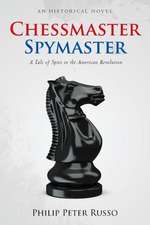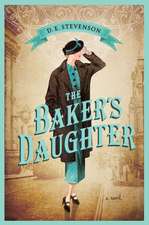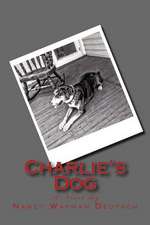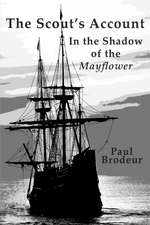The Rose Without a Thorn
Autor Jean Plaidyen Limba Engleză Paperback – 31 mai 2003
royalty, passion, and innocence lost.
Born into an impoverished branch of the noble Howard family, young Katherine is plucked from her home to live with her grandmother, the Duchess of Norfolk. The innocent girl quickly learns that her grandmother’s puritanism is not shared by Katherine’s free-spirited cousins, with whom she lives. Beautiful and impressionable, Katherine becomes involved in two ill-fated love affairs before her sixteenth birthday. Like her cousin Anne Boleyn, she leaves her grandmother’s home to become a lady-in-waiting at the court of Henry VIII. The royal palaces are exciting to a young girl from the country, and Katherine ?nds that her duties there allow her to be near her handsome cousin, Thomas Culpepper, whom she has loved since childhood.
But when Katherine catches the eye of the aging and unhappily married king, she is forced to abandon her plans for a life with Thomas and marry King Henry. Overwhelmed by the change in her fortunes, bewildered and flattered by the adoration of her husband, Katherine is dazzled by the royal life. But her bliss is short-lived as rumors of her wayward past come back to haunt her, and Katherine’s destiny takes another, deadly, turn.
Preț: 100.76 lei
Nou
Puncte Express: 151
Preț estimativ în valută:
19.28€ • 20.18$ • 16.05£
19.28€ • 20.18$ • 16.05£
Carte disponibilă
Livrare economică 10-24 martie
Preluare comenzi: 021 569.72.76
Specificații
ISBN-13: 9780609810170
ISBN-10: 0609810170
Pagini: 288
Dimensiuni: 131 x 205 x 16 mm
Greutate: 0.21 kg
Editura: Three Rivers Press (CA)
ISBN-10: 0609810170
Pagini: 288
Dimensiuni: 131 x 205 x 16 mm
Greutate: 0.21 kg
Editura: Three Rivers Press (CA)
Extras
The Scribe
SHE IS YOUNG, BEAUTIFUL and very frightened.
She said to me: "It is coming nearer. I feel it all about me. There will be no way out. It will be as it was with my cousin Anne. Why did I not see it? Tell me."
I answered: "Your Majesty must not distress yourself. The King loves you as he loved none other...not even your cousin."
The long-lashed hazel eyes regarded me intently.
She answered: "He loved her much in the beginning. He defied the Church for her sake. He sent good men to their deaths because of her. And then he ordered her to be killed. The same fate awaits me. I can already see the executioner's axe ready for me."
"There is no need..." I began.
"There is every need," she replied. "I know you love me. I know you speak out of regard for my feelings. You would give me cheer. But it remains, and there is one thing I would ask of you. The desire has come to me to set it all down, to see it all in clarity, just as it happened. Mayhap it could have been different. I could have been happy with Thomas. He is waiting for me...even now. If I had never gone to Court...if only the King had never looked my way...if only I could go back to the time when it had all begun. No, right to the beginning, those first days--that day when I left my father's home at Lambeth, before I went to my grandmother in Horsham...yes, right to the very beginning, mayhap I could then discover where I might have saved myself. But I am not good with the pen. I was never tutored as I should have been."
"Your Majesty would indeed find such writing an arduous task."
"Yes. And you are my good friend. That is why I ask you to help me in this."
"I? How so?"
"You are a good scribe. It would be an easy task for you. I have a conviction that there will be some time for us to be together in the weeks to come. It will turn my thoughts from what awaits me. I shall tell you how it happened--scene by scene--and you shall write it down as it should be written, for you will know well how to do that. Then you will read to me what I have said, and I shall say, 'Yes, that was how it was.' And I shall say to myself, 'This I...or that...is the way I should have gone.'"
"I think Your Majesty will tire of this ere long."
She shook her head. "I shall not tire, my good friend, for I want so much to see it as it was. Mayhap Thomas will see it. It will help him to understand that, whatever happened before, he was the one I loved."
Her lips trembled and she hesitated for a while before she said with emotion: "And I shall do so as long as there is breath in my body."
I bowed my head and said: "I shall be ready to start as soon as Your Majesty commands."
The Duchess Calls
I SEE NOW THAT IT BEGAN when I went to my grandmother's house in Horsham. That was a long time ago but, without doubt, that was the move which set me on the path which led me to where I stand today. There was nothing I could have done about it. I was a child and such decisions were not made by me. If I had possessed a different nature, if I had not been so ready to love and trust, I might have been wise enough to avoid the pitfalls; but we are as God made us, and what was irresistible temptation to me could have been thrust aside with ease by some. The road is laid before us and we must pass along it, and, through ourselves, come to salvation--or damnation.
Before that significant event, my carefree days were passed in the midst of my large family. There were eight of us children. I was the fifth in order of age, having three brothers and one sister older than myself, and, in time, three sisters younger.
Looking back, it seems that those days were made up of unalloyed pleasure. The fact that we were very poor did not worry us. We lived in a once-grand house in Lambeth, by the river, and our overgrown garden ran down to the water's edge.
What did we care that the house was in need of repair, that there were not enough servants to look after us, and that those who were there were either faithful retainers or stayed because they needed a roof over their heads? Our clothes were torn or patched. Indeed, it was often difficult to know which was patch and which original garment.
Sometimes there was not enough food to go round and we had to eat sparingly. We had no tutors, no governesses. We ran wild and we were free. We played our games: often hide-and-seek which was played in an ancient house, fast falling into ruin, and was very exciting; we danced and sang, which I particularly enjoyed; and we were very happy.
The family fortunes had declined with the coming of the Tudors. My great-grandfather, the first Duke of Norfolk in the Howard family, had supported Richard III and had died with the King on the field of Bosworth. The inevitable outcome was that, when Henry VII came to the throne, he confiscated the family's estates and titles.
However, my grandfather distinguished himself at Flodden Field, where he secured a great victory over the Scots, and his titles and estates were then restored to him by Henry VIII.
My father also fought in the battle at Flodden and, as a reward for his share in the victory, he was awarded the Controllership of Calais. This helped to relieve his poverty to some extent, but he needed more than his remuneration for this post to keep his family and to settle the enormous debts he had accumulated.
He was away from home often, which was a blessing, for it helped him to escape from the creditors who were constantly pursuing him.
So we remained poor but happy. Perhaps it was my nature to be happy. I know I was during those years when I was rushing toward disaster. I certainly had hours of great pleasure, and that is surely happiness. It is one of the reasons why I find it so hard to face this terrible fate which has come upon me.
In those days, I saw little of my father, for he was often in Calais. My mother sometimes accompanied him; and when she was home, she seemed either about to have a child or had just had one. She was loving and kind when I did see her, but I think she found the hardships she had to endure in the Lambeth house not to her liking; and I guessed this was due to the fact that it was very different to the house in which she had been brought up. She was the daughter of Sir Richard Culpepper of Hollingbourne in Kent. There were occasions when some members of her father's household traveled to London, and naturally they must visit us, and I knew then that my mother was ashamed of the squalor in which we lived.
I remember one occasion very well because, with the visitors from Hollingbourne, came Thomas Culpepper. He was a sort of cousin, a little older than I. I thought him wondrously handsome in a rather angelic way. He had the clear features portrayed in a Greek sculpture and such graceful manners. I knew at once that he came from a well-ordered home, quite different from ours: perhaps that was why he seemed to enjoy our free-and-easy manners so much.
We played games. Hide-and-seek was a favorite for, as I said, the large, untidy house and the neglected gardens provided wonderful places in which to hide.
Thomas and I went off to hide together. I showed him the shrubbery, which was especially overgrown, even compared with the rest of the place, and we had to force our way through the shrubs.
"Why do your gardeners not take better care of it?" asked Thomas.
"Nobody looks after anything here," I replied. "We are too poor to pay for it."
Thomas looked at me in dismay and, seeing a fallen tree-trunk, I sat down on it, and prepared to enjoy the company of my exciting young kinsman.
I said: "This is as good a place as any to hide. We should hear anyone approaching." And I signed to him to sit beside me.
"I thought the Howards were a very important family," he said. "The Duke of Norfolk is at Court and close to the King."
"That does not mean we are not poor. You can see that, can you not?"
"I can indeed," said Thomas.
"I heard one of the serving men say some beggars in the streets have more than we have."
"Poor Katherine," he said. "And you are so pretty."
That pleased me, and I wanted more compliments. I looked down at my dress, and I said: "My dress is threadbare. Soon it will be impossible to patch it. All our clothes are patched, and they say that my father goes to Calais to escape his creditors."
"It's a shame," replied Thomas. "So your father goes away...and your mother?"
"There are times when she goes with him."
"I know that she is too ill to go now."
"Yes, she stays in her chamber most of the time."
"It is the reason for our being here. They thought we should come to see her before we had word summoning us."
I must have looked bewildered, for he turned to me and, putting his hands on my shoulders, looked intently at me.
"Yes," he said, "you are very pretty, Katherine Howard."
Then suddenly he kissed me.
I was very pleased, so I returned his kiss.
My sister Margaret said that I showed affection too readily. It was not the way in which a Howard should behave. I did not agree with Margaret. What was wrong with showing people that you liked them, if you did? For one thing, they usually liked you in return, which was surely good.
Thomas looked somewhat embarrassed and drew away from me.
"Do you think we shall be found here?" he asked.
"It is not easy to find people in the gardens."
I wanted to know more about him, so I went on: "My brothers are always talking about going to Court. Do you want to go to Court?"
"I think I shall go," he answered. "They are trying to find a place for me, but it is not easy."
"You would see the King."
"That would be most exciting...particularly now."
"Why now?"
"There is all this talk about the 'secret matter'!"
"Tell me about it," I said, nestling up to him.
"It is said the King wants to divorce the Queen."
"Divorce her?"
"Yes. Send her back to Spain so that he can marry the Lady Anne Boleyn."
"Why doesn't he?"
"The Church won't let him."
"I thought the King could do anything he wanted to."
"That is what he reminds them. The Cardinal is involved. They say it augurs no good for him. There are such comings and goings. It must be very exciting to be there."
"Tell me all about it."
He smiled at me and I thought he was going to kiss me again. I waited, smiling and hopeful. But his mood seemed to change suddenly.
He stood up. He said: "Come. They must have given us up by now." And though I must have shown my disappointment, he was determined. He started to run.
"I'll race you to the house," he said.
A few days later, he left with his family; and it was shortly after that when my mother died.
We were a house of mourning. My father came home from Calais and stayed for a long time. Life did not change very much. I was sure my father deplored the fact that his children did not live as gentlefolk should, but there was nothing he could do about it and he was still in fear that those from whom he had borrowed money would descend upon him, demanding payment.
Then he married again. Her name was Dorothy Troyes and it may be she brought him some dowry, but we still continued to live as before. The new wife must have tried to bring a little order into the establishment, but, with so many children and the house in such ill repair, she found it a hopeless task.
However, change was about to come for me.
My grandfather, the second Duke of Norfolk and hero of Flodden, had died some time before but that had made no difference to our financial position. He had had eight sons by his first wife, and three by his second, one of whom was my father, and there were also daughters, so very little came my father's way.
Then one day the Dowager Duchess of Norfolk, my grandmother, decided to visit her son, probably to inspect the new wife.
There were some rather futile attempts to clean up the place for the Duchess's arrival, accompanied by an unusual amount of activity in the kitchens. We children watched from a hidden vantage-point, overawed by the coming of this very important lady.
She sat in state in the hall, which had once been magnificent, with its vaulted ceiling and the weapons hanging on the walls. I noticed with certain relief that she was sitting on one of the few chairs which were not broken in any way. It had an engraved back, and arms on either side. She looked very regal.
She inspected all the children who stood before her, inarticulate and fearful lest we should give the wrong answers when she addressed us. Her eyes lingered on me and I was greatly alarmed, fearing there must be something particularly wrong with me which had displeased her. Therefore it was with trepidation that I later received a summons to appear before her in the hall.
My father was with her, and he smiled at me encouragingly. He had always a kindly smile for us whenever he saw us, but I never failed to feel that he was rather vague about us. He knew we were his children, but I doubted whether he could put a name to most of us.
Now he said: "Katherine, Her Grace would speak with you."
I curtsied in her direction and waited with apprehension.
"Come here, child," she commanded.
I approached. Although aging, she was quite handsome, and clearly took pains with her appearance, for she was most elegantly dressed. There were several rings on her fingers, and she was holding a stick, the handle of which was set with stones which looked like emeralds.
"Come closer," she said.
I obeyed and she went on: "H'm. Pretty child. And knows it, I doubt not. Do you, child?"
I did not know what to say to that, so said nothing.
"Do you? Do you?" she went on with a hoarse chuckle.
"Yes, Your Grace," I answered meekly.
That made her laugh. "Truthful, eh? That is good. But what a state you live in, Edmund. No way to bring up children. I hope the child remembers she's a Howard. Do you?" she demanded of me.
"Yes, Your Grace," I said again.
"Come closer."
I obeyed.
SHE IS YOUNG, BEAUTIFUL and very frightened.
She said to me: "It is coming nearer. I feel it all about me. There will be no way out. It will be as it was with my cousin Anne. Why did I not see it? Tell me."
I answered: "Your Majesty must not distress yourself. The King loves you as he loved none other...not even your cousin."
The long-lashed hazel eyes regarded me intently.
She answered: "He loved her much in the beginning. He defied the Church for her sake. He sent good men to their deaths because of her. And then he ordered her to be killed. The same fate awaits me. I can already see the executioner's axe ready for me."
"There is no need..." I began.
"There is every need," she replied. "I know you love me. I know you speak out of regard for my feelings. You would give me cheer. But it remains, and there is one thing I would ask of you. The desire has come to me to set it all down, to see it all in clarity, just as it happened. Mayhap it could have been different. I could have been happy with Thomas. He is waiting for me...even now. If I had never gone to Court...if only the King had never looked my way...if only I could go back to the time when it had all begun. No, right to the beginning, those first days--that day when I left my father's home at Lambeth, before I went to my grandmother in Horsham...yes, right to the very beginning, mayhap I could then discover where I might have saved myself. But I am not good with the pen. I was never tutored as I should have been."
"Your Majesty would indeed find such writing an arduous task."
"Yes. And you are my good friend. That is why I ask you to help me in this."
"I? How so?"
"You are a good scribe. It would be an easy task for you. I have a conviction that there will be some time for us to be together in the weeks to come. It will turn my thoughts from what awaits me. I shall tell you how it happened--scene by scene--and you shall write it down as it should be written, for you will know well how to do that. Then you will read to me what I have said, and I shall say, 'Yes, that was how it was.' And I shall say to myself, 'This I...or that...is the way I should have gone.'"
"I think Your Majesty will tire of this ere long."
She shook her head. "I shall not tire, my good friend, for I want so much to see it as it was. Mayhap Thomas will see it. It will help him to understand that, whatever happened before, he was the one I loved."
Her lips trembled and she hesitated for a while before she said with emotion: "And I shall do so as long as there is breath in my body."
I bowed my head and said: "I shall be ready to start as soon as Your Majesty commands."
The Duchess Calls
I SEE NOW THAT IT BEGAN when I went to my grandmother's house in Horsham. That was a long time ago but, without doubt, that was the move which set me on the path which led me to where I stand today. There was nothing I could have done about it. I was a child and such decisions were not made by me. If I had possessed a different nature, if I had not been so ready to love and trust, I might have been wise enough to avoid the pitfalls; but we are as God made us, and what was irresistible temptation to me could have been thrust aside with ease by some. The road is laid before us and we must pass along it, and, through ourselves, come to salvation--or damnation.
Before that significant event, my carefree days were passed in the midst of my large family. There were eight of us children. I was the fifth in order of age, having three brothers and one sister older than myself, and, in time, three sisters younger.
Looking back, it seems that those days were made up of unalloyed pleasure. The fact that we were very poor did not worry us. We lived in a once-grand house in Lambeth, by the river, and our overgrown garden ran down to the water's edge.
What did we care that the house was in need of repair, that there were not enough servants to look after us, and that those who were there were either faithful retainers or stayed because they needed a roof over their heads? Our clothes were torn or patched. Indeed, it was often difficult to know which was patch and which original garment.
Sometimes there was not enough food to go round and we had to eat sparingly. We had no tutors, no governesses. We ran wild and we were free. We played our games: often hide-and-seek which was played in an ancient house, fast falling into ruin, and was very exciting; we danced and sang, which I particularly enjoyed; and we were very happy.
The family fortunes had declined with the coming of the Tudors. My great-grandfather, the first Duke of Norfolk in the Howard family, had supported Richard III and had died with the King on the field of Bosworth. The inevitable outcome was that, when Henry VII came to the throne, he confiscated the family's estates and titles.
However, my grandfather distinguished himself at Flodden Field, where he secured a great victory over the Scots, and his titles and estates were then restored to him by Henry VIII.
My father also fought in the battle at Flodden and, as a reward for his share in the victory, he was awarded the Controllership of Calais. This helped to relieve his poverty to some extent, but he needed more than his remuneration for this post to keep his family and to settle the enormous debts he had accumulated.
He was away from home often, which was a blessing, for it helped him to escape from the creditors who were constantly pursuing him.
So we remained poor but happy. Perhaps it was my nature to be happy. I know I was during those years when I was rushing toward disaster. I certainly had hours of great pleasure, and that is surely happiness. It is one of the reasons why I find it so hard to face this terrible fate which has come upon me.
In those days, I saw little of my father, for he was often in Calais. My mother sometimes accompanied him; and when she was home, she seemed either about to have a child or had just had one. She was loving and kind when I did see her, but I think she found the hardships she had to endure in the Lambeth house not to her liking; and I guessed this was due to the fact that it was very different to the house in which she had been brought up. She was the daughter of Sir Richard Culpepper of Hollingbourne in Kent. There were occasions when some members of her father's household traveled to London, and naturally they must visit us, and I knew then that my mother was ashamed of the squalor in which we lived.
I remember one occasion very well because, with the visitors from Hollingbourne, came Thomas Culpepper. He was a sort of cousin, a little older than I. I thought him wondrously handsome in a rather angelic way. He had the clear features portrayed in a Greek sculpture and such graceful manners. I knew at once that he came from a well-ordered home, quite different from ours: perhaps that was why he seemed to enjoy our free-and-easy manners so much.
We played games. Hide-and-seek was a favorite for, as I said, the large, untidy house and the neglected gardens provided wonderful places in which to hide.
Thomas and I went off to hide together. I showed him the shrubbery, which was especially overgrown, even compared with the rest of the place, and we had to force our way through the shrubs.
"Why do your gardeners not take better care of it?" asked Thomas.
"Nobody looks after anything here," I replied. "We are too poor to pay for it."
Thomas looked at me in dismay and, seeing a fallen tree-trunk, I sat down on it, and prepared to enjoy the company of my exciting young kinsman.
I said: "This is as good a place as any to hide. We should hear anyone approaching." And I signed to him to sit beside me.
"I thought the Howards were a very important family," he said. "The Duke of Norfolk is at Court and close to the King."
"That does not mean we are not poor. You can see that, can you not?"
"I can indeed," said Thomas.
"I heard one of the serving men say some beggars in the streets have more than we have."
"Poor Katherine," he said. "And you are so pretty."
That pleased me, and I wanted more compliments. I looked down at my dress, and I said: "My dress is threadbare. Soon it will be impossible to patch it. All our clothes are patched, and they say that my father goes to Calais to escape his creditors."
"It's a shame," replied Thomas. "So your father goes away...and your mother?"
"There are times when she goes with him."
"I know that she is too ill to go now."
"Yes, she stays in her chamber most of the time."
"It is the reason for our being here. They thought we should come to see her before we had word summoning us."
I must have looked bewildered, for he turned to me and, putting his hands on my shoulders, looked intently at me.
"Yes," he said, "you are very pretty, Katherine Howard."
Then suddenly he kissed me.
I was very pleased, so I returned his kiss.
My sister Margaret said that I showed affection too readily. It was not the way in which a Howard should behave. I did not agree with Margaret. What was wrong with showing people that you liked them, if you did? For one thing, they usually liked you in return, which was surely good.
Thomas looked somewhat embarrassed and drew away from me.
"Do you think we shall be found here?" he asked.
"It is not easy to find people in the gardens."
I wanted to know more about him, so I went on: "My brothers are always talking about going to Court. Do you want to go to Court?"
"I think I shall go," he answered. "They are trying to find a place for me, but it is not easy."
"You would see the King."
"That would be most exciting...particularly now."
"Why now?"
"There is all this talk about the 'secret matter'!"
"Tell me about it," I said, nestling up to him.
"It is said the King wants to divorce the Queen."
"Divorce her?"
"Yes. Send her back to Spain so that he can marry the Lady Anne Boleyn."
"Why doesn't he?"
"The Church won't let him."
"I thought the King could do anything he wanted to."
"That is what he reminds them. The Cardinal is involved. They say it augurs no good for him. There are such comings and goings. It must be very exciting to be there."
"Tell me all about it."
He smiled at me and I thought he was going to kiss me again. I waited, smiling and hopeful. But his mood seemed to change suddenly.
He stood up. He said: "Come. They must have given us up by now." And though I must have shown my disappointment, he was determined. He started to run.
"I'll race you to the house," he said.
A few days later, he left with his family; and it was shortly after that when my mother died.
We were a house of mourning. My father came home from Calais and stayed for a long time. Life did not change very much. I was sure my father deplored the fact that his children did not live as gentlefolk should, but there was nothing he could do about it and he was still in fear that those from whom he had borrowed money would descend upon him, demanding payment.
Then he married again. Her name was Dorothy Troyes and it may be she brought him some dowry, but we still continued to live as before. The new wife must have tried to bring a little order into the establishment, but, with so many children and the house in such ill repair, she found it a hopeless task.
However, change was about to come for me.
My grandfather, the second Duke of Norfolk and hero of Flodden, had died some time before but that had made no difference to our financial position. He had had eight sons by his first wife, and three by his second, one of whom was my father, and there were also daughters, so very little came my father's way.
Then one day the Dowager Duchess of Norfolk, my grandmother, decided to visit her son, probably to inspect the new wife.
There were some rather futile attempts to clean up the place for the Duchess's arrival, accompanied by an unusual amount of activity in the kitchens. We children watched from a hidden vantage-point, overawed by the coming of this very important lady.
She sat in state in the hall, which had once been magnificent, with its vaulted ceiling and the weapons hanging on the walls. I noticed with certain relief that she was sitting on one of the few chairs which were not broken in any way. It had an engraved back, and arms on either side. She looked very regal.
She inspected all the children who stood before her, inarticulate and fearful lest we should give the wrong answers when she addressed us. Her eyes lingered on me and I was greatly alarmed, fearing there must be something particularly wrong with me which had displeased her. Therefore it was with trepidation that I later received a summons to appear before her in the hall.
My father was with her, and he smiled at me encouragingly. He had always a kindly smile for us whenever he saw us, but I never failed to feel that he was rather vague about us. He knew we were his children, but I doubted whether he could put a name to most of us.
Now he said: "Katherine, Her Grace would speak with you."
I curtsied in her direction and waited with apprehension.
"Come here, child," she commanded.
I approached. Although aging, she was quite handsome, and clearly took pains with her appearance, for she was most elegantly dressed. There were several rings on her fingers, and she was holding a stick, the handle of which was set with stones which looked like emeralds.
"Come closer," she said.
I obeyed and she went on: "H'm. Pretty child. And knows it, I doubt not. Do you, child?"
I did not know what to say to that, so said nothing.
"Do you? Do you?" she went on with a hoarse chuckle.
"Yes, Your Grace," I answered meekly.
That made her laugh. "Truthful, eh? That is good. But what a state you live in, Edmund. No way to bring up children. I hope the child remembers she's a Howard. Do you?" she demanded of me.
"Yes, Your Grace," I said again.
"Come closer."
I obeyed.
Descriere
A wonderfully engrossing first-person account of Katherine Howard, King Henry VIII's fifth wife. Cousin to Anne Boleyn, Katherine took a very different path to come to the same unjust fate.
Notă biografică
Jean Plaidy
